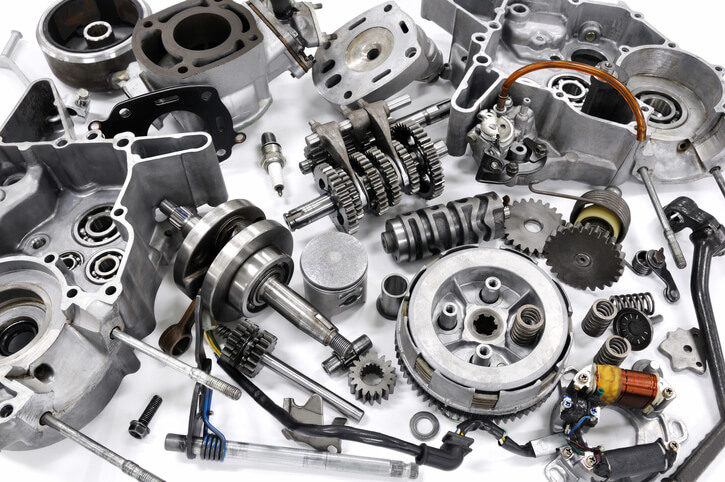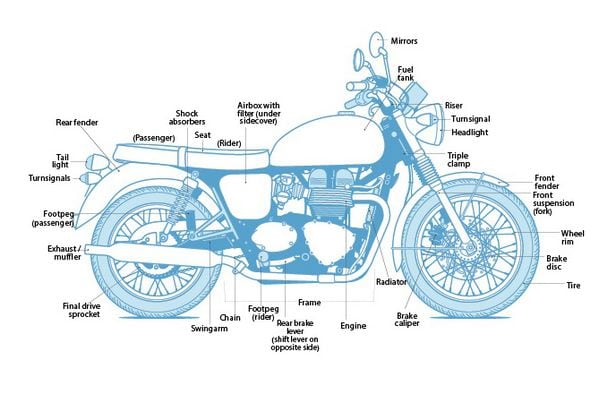Upgrade Strategies Using Aftermarket-Compatible Motorbike Components NZ
Upgrade Strategies Using Aftermarket-Compatible Motorbike Components NZ
Blog Article
Discover the Necessary Motorcycle Parts You Required for Optimum Performance
Comprehending the important parts of a motorbike is basic for achieving peak performance. Each component, from the engine to the stopping system, plays an important duty in total capability and safety and security. Normal maintenance can avoid unanticipated failures and improve the riding experience. Nevertheless, many bikers ignore the ins and outs of these systems. Uncovering just how they collaborate can cause a more effective experience. What essential elements should every biker focus on?
The Engine: The Heart of Your Motorcycle
The engine acts as the core element of a bike, driving its performance and defining its capabilities. It is liable for converting fuel into power, which powers the bike ahead. Different sorts of engines are employed, including single-cylinder, V-twin, and inline configurations, each offering distinct features suited for various riding functions and styles. The engine dimension, normally measured in cubic centimeters (cc), considerably affects efficiency, with bigger engines generally offering even more power and torque.Furthermore, the engine's design and innovation, such as gas shot systems or air-cooling versus liquid-cooling, impact effectiveness and reliability. Upkeep is important for peak procedure; variables like normal oil modifications and checking trigger connects warranty long life. Motorcyclists commonly think about an engine's responsiveness and level of smoothness, as these characteristics boost the overall riding experience. Eventually, the engine remains a critical aspect that defines not only the bike's efficiency yet additionally the biker's connection to the maker.
The Transmission: Changing Gears Smoothly
The transmission plays an important role in a motorbike's performance, particularly in the mechanics of gear changing. Recognizing just how to shift gears efficiently can enhance the total riding experience, while normal upkeep guarantees peak performance. Proper interest to these facets can substantially impact the longevity and efficiency of the motorbike.

Gear Shifting Mechanics
Smooth equipment moving is important for ideal motorcycle performance, substantially affecting both velocity and control. The mechanics of equipment moving include the interaction between the clutch, gear bar, and transmission system. When a biker involves the clutch, it disengages the engine from the transmission, allowing for an equipment modification without harming the components. A well-timed launch of the clutch, combined with exact activity of the equipment lever, facilitates a smooth change between gears. This procedure guarantees that the engine operates within its best power band, enhancing performance. Motorcycle Parts Auckland. In addition, recognizing the equipment ratios and their impact on rate and torque can help motorcyclists make informed options throughout changes, ultimately contributing to an extra enjoyable and receptive riding experience
Maintenance Tips Relevance
Regular upkeep plays an essential role in assuring that the transmission system runs successfully, permitting for smooth gear changes. Frequently altering the transmission and inspecting fluid is crucial, as old liquid can bring about enhanced rubbing and wear. In addition, checking the clutch for wear warranties peak interaction and disengagement, protecting against slippage throughout equipment changes. Lubrication of relocating parts is just as crucial to decrease rubbing and improve performance. Bike proprietors ought to also keep track of for leakages and unusual noises, as these can suggest underlying problems. By adhering to these upkeep ideas, motorcyclists can lengthen the life-span of their transmission system, assuring that gear changes remain seamless and adding to the overall performance of their motorcycle.
The Braking System: Ensuring Security on Every Trip
Braking systems are basic components that straight affect a motorbike's security and efficiency. They include different parts, including brake pads, rotors, calipers, and hydraulic lines, all collaborating to guarantee effective slowdown. The type of stopping system-- usually either disc or drum-- impacts responsiveness and stopping power.Regular upkeep is vital to copyright peak performance; used brake pads can result in lowered effectiveness and boosted quiting ranges. Additionally, the quality of brake liquid ought to be kept track of, as it can soak up dampness with time, jeopardizing stopping efficiency.Riders should likewise take into consideration the relevance of anti-lock stopping systems (ABDOMINAL MUSCLE), which avoid wheel lockup during abrupt stops, improving overall security. Correctly working brakes are not practically quiting; they instill self-confidence in the rider, permitting much safer navigation via different terrains. Ultimately, a trusted stopping system is crucial for delighting in every ride with assurance.
The Suspension: Enhancing Convenience and Control
A well-functioning shock absorber significantly contributes to a motorcycle's overall performance, matching the effectiveness of the stopping system. The suspension plays a substantial duty in soaking up shocks from irregular surfaces, assuring a smoother adventure while maintaining tire contact with the roadway. This call is vital for both stability and control, allowing bikers to browse edges with self-confidence and precision.Different sorts of shock absorber, such as telescopic forks or mono-shocks, use differing levels of convenience and handling. Properly tuned suspension improves responsiveness, supplying the rider with an extra linked feeling to the motorbike. Regular maintenance checks are necessary to establish the suspension elements, consisting of springtimes and dampers, are functioning at their best. An efficient suspension system not just raises the riding experience but likewise contributes to the longevity of various other motorbike components by reducing wear and tear. Therefore, purchasing high quality suspension is important for any serious motorbike enthusiast.
The Tires: Connecting You to the Roadway
Tires play pop over to these guys a vital duty in a motorbike's efficiency, functioning as the key web link between the motorcyclist and the roadway. Understanding the different sorts of tires readily available can significantly impact taking care of and safety. Furthermore, normal upkeep is vital to guarantee peak tire efficiency and longevity.
Tire Enters Explained
Just how do different tire kinds affect a motorbike's efficiency? Tire kinds play an important function in establishing a motorbike's security, grip, and handling. Sport tires, developed for high performance, offer boosted traction and responsiveness on paved roads, making them excellent for competing and hostile riding. Alternatively, touring tires focus on sturdiness and convenience, giving a smoother ride for long-distance traveling. Off-road tires, identified by their tough tread patterns, stand out in grip on unpaved surfaces, suitable for journey enthusiasts. Furthermore, dual-sport tires blend attributes from both on-road and off-road categories, satisfying functional riding needs. Ultimately, selecting the right tire kind is necessary for optimizing efficiency, guaranteeing security, and enhancing the total riding experience.
Upkeep Tips Offered
While riding when traveling, maintaining ideal tire condition is essential for safety and security and performance. Consistently examining tire stress is very important, as under-inflated tires can lead to inadequate handling and increased wear. It is suggested to examine tread deepness often; used tires concession grasp and security. On top of that, cyclists should try to find indicators of damage, such as bulges or cracks, which can show the requirement for substitute. Rotating tires regularly guarantees even put on, boosting longevity. Maintaining tires tidy from particles and avoiding too much aesthetics can prolong their lifespan. Lastly, maintaining appropriate alignment and equilibrium adds to peak efficiency, lessening stress and anxiety on various other bike elements. Sticking to these maintenance ideas will considerably boost the total riding experience.
The Gas System: Sustaining Performance and Efficiency
The gas system plays a crucial role in making the most of a motorcycle's performance and performance, as it ensures the ideal distribution of gas to the engine. It comprises several vital components, consisting of the fuel container, gas pump, fuel filter, and fuel injectors or carburetor. Each component should operate successfully to assure a smooth and effective ride.The gas container stores gas and supplies it to the engine via the gas pump, which generates the necessary stress. A gas filter prevents impurities from getting in the engine, while the injectors or carburetor mix gas with air for combustion.Proper upkeep of the gas system is vital; a clogged up filter or malfunctioning injector can lead to decreased performance and increased fuel consumption. By verifying that the fuel system runs effectively, bikers can enjoy enhanced throttle reaction, better fuel economic climate, and overall enhanced riding experience.
The Electric System: Powering Your Trip
An effective electric system is essential for the general capability and security of a motorcycle, as it powers critical components such as the ignition, lighting, and click for info numerous electronic systems. This system consists of the battery, which stores power, and the generator, liable for generating power while the engine runs. The circuitry harness attaches these components, making sure trustworthy power distribution.Additionally, fuses secure the system from overloads, while relays aid control high-current tools with low-power signals. A well-maintained electrical system improves efficiency by ensuring see this page smooth beginnings and constant procedure of signals and lights, crucial for motorcyclist visibility and safety.Regular checks of the battery's fee and connections are necessary for protecting against electrical failures. Riders must likewise examine circuitry for deterioration, making sure all elements work ideally. Inevitably, a durable electrical system adds substantially to the general efficiency and integrity of the motorbike.
Often Asked Questions
How Usually Should I Replace My Bike's Battery?
The regularity of motorcycle battery replacement depends upon usage and upkeep (Bike Parts Wellington). Typically, batteries should be replaced every 3 to 5 years. Routine checks can aid recognize when a substitute is necessary for peak efficiency
What Tools Do I Need for Fundamental Motorcycle Maintenance?
For standard motorcycle maintenance, one calls for necessary devices such as an outlet collection, wrenches, screwdrivers, pliers, tire pressure scale, and a torque wrench. These tools help with effective upkeep and guarantee the motorcycle runs efficiently and safely.
Just How Can I Improve My Bike's Aerodynamics?
To enhance motorbike aerodynamics, one ought to consider adjusting fairings, making use of windshield expansions, maximizing body setting, and minimizing total weight. These adjustments assist decrease drag, enhancing stability and gas effectiveness throughout adventures.
What Are the Signs of a Failing Electrical System?
Indicators of a stopping working electric system include dimming lights, problem beginning, uneven instrument analyses, and blown merges. Motorcycle Parts Auckland. Uncommon scents or deterioration around battery terminals might likewise indicate underlying concerns needing immediate focus for security and efficiency

How Do I Select the Right Oil for My Bike?
When picking oil for a bike, one ought to take into consideration the producer's specs, thickness ratings, and the kind of riding. Additionally, artificial versus standard oil can influence efficiency and engine defense, affecting the decision substantially. The engine size, typically gauged in cubic centimeters (cc), substantially affects performance, with bigger engines generally giving more power and torque.Furthermore, the engine's style and innovation, such as fuel shot systems or air-cooling versus liquid-cooling, impact performance and dependability. A well-functioning suspension system considerably adds to a motorcycle's overall efficiency, matching the efficiency of the stopping system. The fuel system plays an essential function in taking full advantage of a motorcycle's efficiency and effectiveness, as it assures the optimal delivery of fuel to the engine. A gas filter prevents impurities from entering the engine, while the injectors or carburetor mix gas with air for combustion.Proper upkeep of the fuel system is essential; a clogged up filter or malfunctioning injector can lead to lowered efficiency and increased fuel intake. A well-kept electrical system improves performance by guaranteeing smooth begins and constant operation of lights and signals, important for biker visibility and safety.Regular checks of the battery's cost and connections are essential for protecting against electric failures.
Report this page